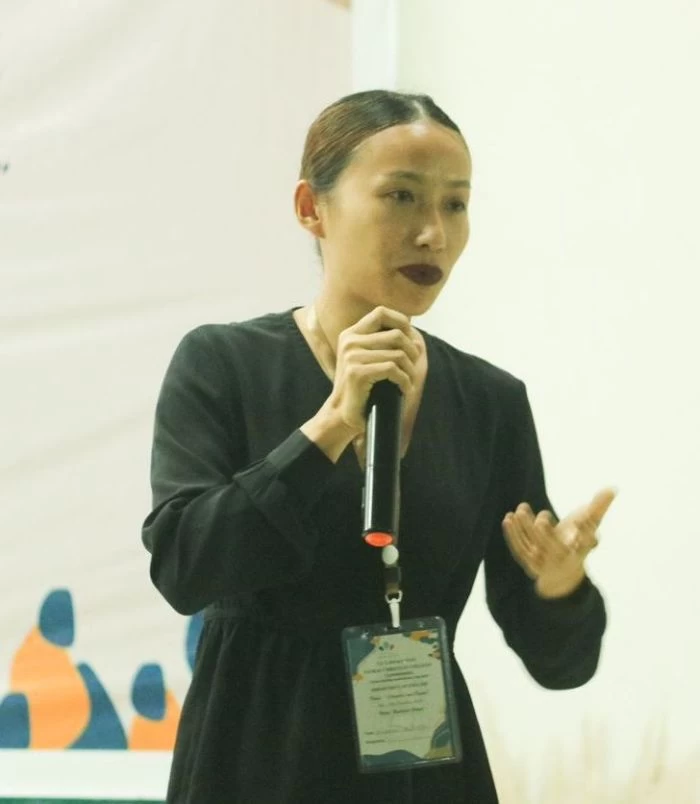1st literary fest organised by Department of English, Patkai Christian College (Autonomous) was held on October 6 and 7.

Patkai, October 7 (MExN): The 1st literary fest organised by the Department of English, Patkai Christian College (Autonomous) with the theme ‘Literature and Beyond’ was held at Bundrock Chapel on October 6 and 7.
An update from the college stated that the head of the department, Rüületo Vakha said, “This is an event where we can look and reflect into all that the literary world encompasses: the past, the present trends and a peep into the future as well.”
Speaking at the inaugural session, Dr Thepfüvilie Pierü, Principal, PCC expressed hope that the literary fest will help the students explore the many facets of academia.
‘News and narratives’

Dr Moalemba Jamir, Associate Editor at The Morung Express, speaking as the resource person dwelled on ‘News and Narrative: A Prismatic Interrogation.’
Dr Jamir shared that both news and narrative share the common thread of disseminating information to the general public or an audience, albeit in different ways. News, he said, gave factual information, while narratives are a form of communication or storytelling to convey a message, entertain, or inform. He mentioned novels as an example of narratives. Fictional stories are longer and more complex and explore themes of human nature and softies in a deeper way than news stories, he explained.
He contended that both news and narratives are powerful tools that can be used to inform, persuade and motivate the trajectory of society. “It can also promote social values such as democracy, freedom and justice,” he added.
Decolonising language

Poet and academic, Dr Theyiesinuo Keditsu spoke on ‘Literature and beyond’. Basing on Ngugi Wa Thiong’s argument, she said language is more than just a means of communication, carrying within it a universe of references and values that are specific to the culture from which it originates.
“By learning English, we learn about the values and references that are specific to a culture. We learn about Shakespeare and Wordsworth and somehow in these years that we study English, we come to think that the standard of literature or even the word ‘literature’ only pertains to Wordsworth and Shakespeare. The danger is that along with the references and values, language also carries with it racist images and stereotypes that perpetuate a false ideology,” she maintained.
Pointing to the rich oral literature among Nagas, she questioned if it was possible for Nagas to develop a language that resists the colonising language or create literature that transforms images and representations of Nagas themselves.
“Unless we reincorporate what is real in our lives, we are constantly going to be imitating literature of Shakespeare and Wordsworth; reproducing images that are going to be increasingly irrelevant to the next generation,” she asserted.
‘Memory keepers and storytellers’
Speaking on ‘Memory keepers and storytellers’, Dr Lanusangla Tzudir, Founder, Heritage Publishing House asserted that Nagas must take responsibility and ownership of their stories to assert their position as memory keepers and storytellers.
She viewed that oral tradition was not a mere form of storytelling. “It is much more than that, it has evolved into a comprehensive and integrated network of indigenous knowledge systems, incorporating art with reality, history with imagination, and the ideal with practical,” she insisted.
She urged the students to engage in a search for genuine approaches to find stories of courage and a collective narrative beyond the stories of militarisation, oppression, trauma and destruction. The stories of trauma and oppression have fragmented and dominated the narratives for the past many years, she rued.
One way to restore the vibrant Naga history is to start with the oral traditions of telling and hearing each other’s stories and transcend the identities that shape our existential realities of the present times. “In other words, the core of it implies defining who we are,” she said.
‘Art is about creativity and skill’

On day-two, Renbeni M Kikon, an alumnus of Patkai Christian College delivered on the re-emergence of art and theatre. “Art is about creativity and skill,” she emphasised, encouraging all attendees to embrace their creative instincts. Addressing the literature students, she remarked, “As literature students, we are all creators.”
Following Kikon’s talk, an engaging Q&A session ensued, allowing students to participate and seek insights from the accomplished speaker.
BA 5th semester students presented a movie review on ‘East is East.’ BA 1st semester students showcased performance of an Indian Classical play, “Abhijanasakuntalam.” MA 3rd semester delved into the folklores of Nagaland, presenting an enlightening exploration of the cultural uniqueness and traditions of the Nagas. The presentation offered the audience a glimpse into the folklore, customs, traditions and origin of the Nagas and also highlighting the Zeliang and the Angami tribes.






